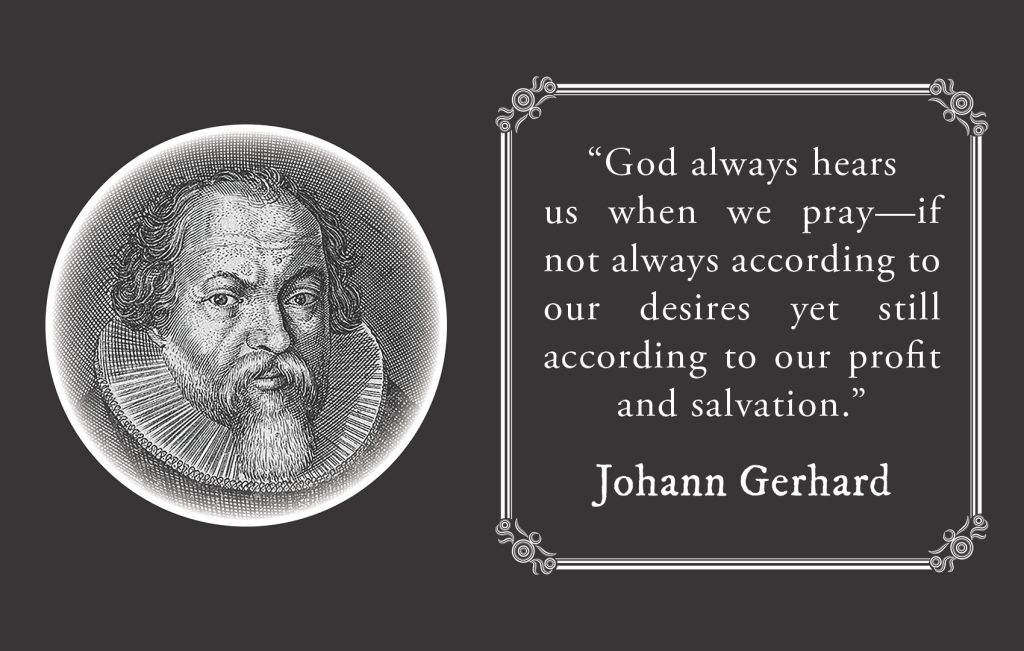The Power of Prayer

by Johann Gerhard
It is a mark of great favour on the part of God that He desires the godly to approach Him in prayer in a spirit of familiar friendship. He gives us the desire to pray, and likewise makes our prayers effective. Great indeed is the power of prayer, which though it is offered upon earth is effective in heaven. The prayer of a righteous man is the key to the treasury of heaven; the request ascends to heaven, and the answer of pardon and peace descends from God.
Prayer is like a shield of safety for believers, quenching all the darts of the adversary (Ephesians 6:16). When Moses held up his hands, Israel prevailed against the Amalekites (Exodus 17:11); and if you hold up your hands towards heaven in prayer, Satan shall not prevail against you. As a massive wall resists and opposes the advance of an enemy, so is the holy wrath of God averted by the prayers of His saints.
Our Saviour Himself prayed, not for the supply of His own needs but to teach us the worth and dignity of prayer. Prayer is a mark of subjugation, because God bids us offer prayers to Him daily as a sort of spiritual tribute to Him. It is a ladder by which we ascend to heaven, for prayer is nothing else than the drawing near of our minds to God. It is a shield of defence, because the soul that lives daily in a spirit of prayer is secure from the insults of devils.
Prayer is a faithful messenger we send to the throne of God, to call Him to our aid in time of need. This messenger is never thwarted in His mission, for God always hears us when we pray—if not always according to our desires yet still according to our profit and salvation. We may without doubt hope for one of two things: either that God will give us just what we ask for, or that He will grant us that which He knows is more profitable for us. God, unasked, has given us the most excellent gift He had to bestow, even His own Son! What then will He not give us when we beg at His throne?
This messenger is never thwarted in His mission, for God always hears us when we pray—if not always according to our desires yet still according to our profit and salvation.
We must not doubt either God’s readiness to hear our prayers nor our Saviour’s active intercession on our behalf. Under any and all circumstances, you may, like Moses, enter the tabernacle to take counsel with the Lord in prayer—and quickly will you hear the divine response. When Christ prayed, He was transfigured; and so prayer transforms and transfigures our souls. For prayer is as a light to the soul, and very frequently leaves it exulting with joy which it first found cast down in despair.
How can you look upon the sun unless you have first adored Him who gives you its beneficial light? How can you enjoy the bounties of your table unless you have first given thanks to Him who so abundantly supplies the good things of life? With what hope can you resign yourself to the slumbers of night if you have not first fortified yourself with prayer? What fruit can you expect from your labours if you do not first invoke the blessing of God upon them, without whom all labour must be fruitless?
If, therefore, you desire spiritual or temporal gifts, ask and you shall receive (Matthew 7:7). If you desire Christ, seek Him in prayer and you shall find Him. If you desire the door of divine grace and eternal salvation be opened, knock through prayer, and it shall be opened to you. If in your pilgrimage through this wild world you are afflicted with spiritual thirst through temptation and a lack of spiritual blessings, come in devotion to the spiritual Rock—that is, Christ—and strike it with the rod of prayer. Streams of divine grace shall flow forth to quench your thirst and supply your need.
Do you wish to offer a pleasing sacrifice to God? Offer prayer. The Lord will perceive the sweet odor of your sacrifice and His wrath shall recede. Would you hold constant dialogue with God? Take delight in prayer, for this is spiritual conversation between God and the devout soul. Would you taste and see that the Lord is good (Psalm 34:9)? Then urge the Lord by prayer to take up His abode in your heart.
Prayer is pleasing to God but only when offered in His appointed way. If, therefore, you would be heard in prayer, pray wisely, ardently, humbly, faithfully, perseveringly, and confidently. Pray wisely, that is, for those things that may be for the glory of God and for the salvation of your fellow men. God is almighty; therefore, do not strive in your prayer to limit or restrict His power. He is all-wise; do not then prescribe any set way by which your prayer should be answered. Do not be rash or presumptuous in your prayers but let them issue from a heart full of faith. Faith, however, has due regard for the Divine Word. What God promises absolutely in His Word, that you may pray for absolutely. But what He promises conditionally—for example, temporal blessings—these you should pray for conditionally. And what He has not promised at all you should in no way pray for you; often God gives us in holy anger what in mercy He denies us.
Pray ardently. For how can you ask God to hear you, when you do not even listen to yourself? Would you have God be mindful of you when you are not even mindful of yourself? When you would pray, then, enter your room and close the door (Matthew 6:6). Your heart is that room, into which you should enter if you would pray rightly. You must close the door so that distracting thoughts of worldly affairs do not enter in to disturb you.
Take delight in prayer, for this is spiritual conversation between God and the devout soul.
There are no voices that will reach the ears of God except the deep emotions of the soul; the mind ought to be so stirred by the passion of our meditations, that it far exceeds what the tongue expresses. This is to pray in spirit and in truth (John 4:23) as our Lord requires. Christ prayed on a mountain (Luke 6:12), and lifted up His eyes to heaven (John 17:1), and so we ought to turn our minds away from created things and direct them to God. You do God an injury if you ask Him to pay attention to your prayers when you do not even pay attention yourself.
We can pray without ceasing (1 Thessalonians 5:17) if we pray in the spirit, so that at least our mind is always watchful to God in holy desires. It is not necessary that we should supplicate God with loud cries, because as He dwells in the hearts of the godly, He hears the very sighs of our hearts. Nor do we need to multiply words in our prayers; for He knows our thoughts. Sometimes a single groan under the impulse of the Spirit of God offered up in the power of that Spirit is more pleasing to God than a long and tedious repetition of prayers, where the tongue speaks but the heart is altogether silent.
Pray humbly, trusting not in your own merit but only in the grace of God. If our prayers are offered relying on our own worthiness, they are condemned in God’s sight—even if in the passion of devotion our hearts were to sweat blood! No one can do that which is pleasing to God except in Christ. And no one can pray acceptably except in the name of Christ and relying upon His merit. No sacrifices were acceptable to God except those offered on the altar of God’s appointed tabernacle alone (Deuteronomy 12:5). And no prayer can be acceptable to God except on the altar which He appointed: Jesus Christ.
The Lord promised to hear the prayers of Israel if they prayed with their faces turned toward Jerusalem (1 Kings 8:44). So in our prayers, let us turn ourselves towards Christ, who is indeed the temple of the Godhead (John 2:19,21). When Christ prayed in Gethsemane, He cast Himself down upon the ground (Mark 14:35); behold how that most holy soul humbles Himself in the presence of the divine majesty!
Pray faithfully, so that you may rightly bear deprivation of every joy and patiently endure every chastisement. The sooner we pray, the better for us. The more frequently we offer up our devotions, the more profitable will it be. The more fervently we approach God, the more acceptable shall our prayers be to Him.
Pray perseveringly, because when God delays the answer, He is not always denying us but sometimes simply commending His gifts; and those gifts that we have desired for a long time we relish more keenly when we finally obtain them. Pray confidently, asking truly in faith and not wavering.
O most merciful, indulgent God, who has bidden us to come to You in prayer, help us to pray acceptably unto You!

———————
Johann Gerhard (1582-1637) was a prominent Lutheran theologian who in 1606 published a popular devotional book entitled Sacred Meditations. The article above is Meditation 24, and is lightly updated from C.W. Heisler’s 1896 translation.
Engraving of Johann Gerhard, printed by Peter Troschel, c. 1650, alt.




